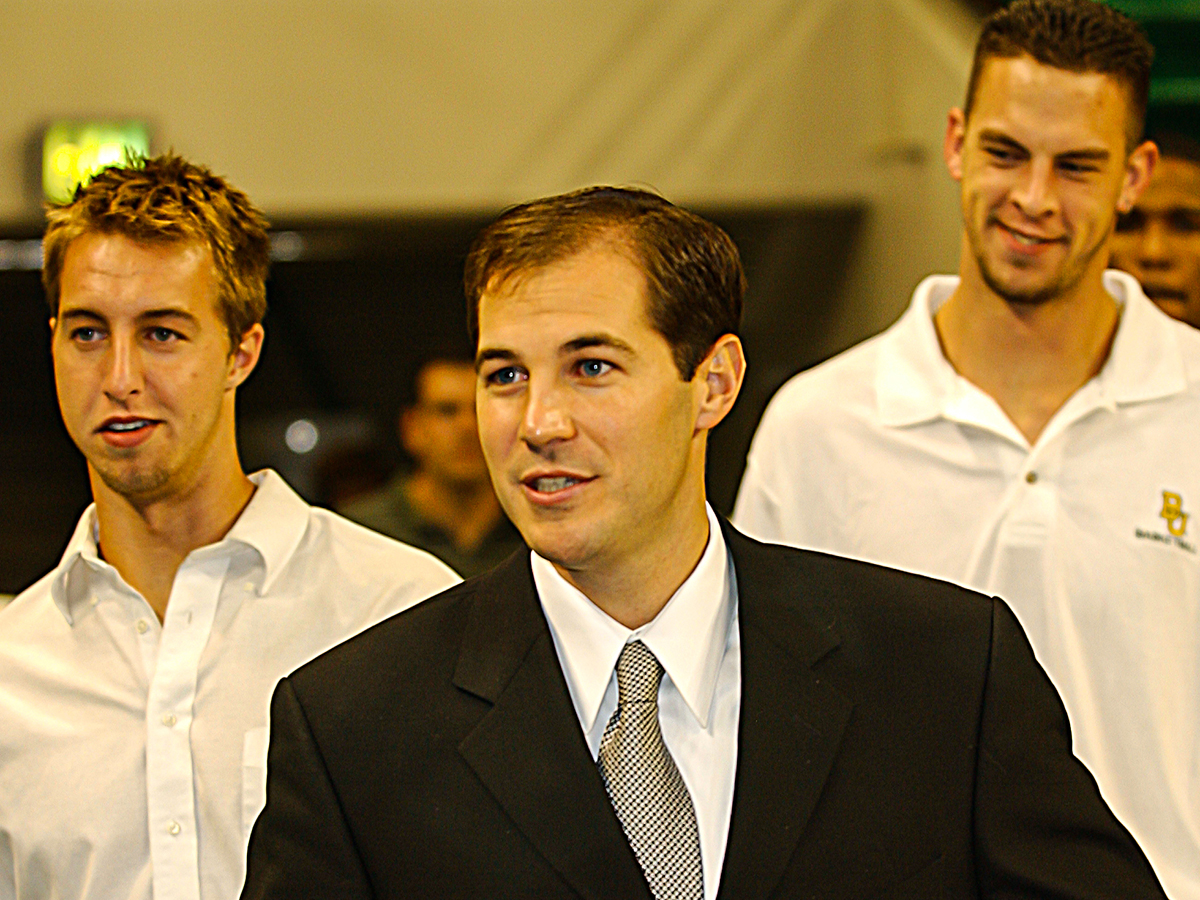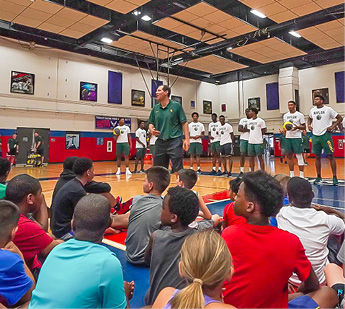Culture of Joy
Scott Drew's trademark positivity propelled by his deeply rooted faith has built a foundation for success on the court.
Proverbs 17:22 says, “A cheerful heart is good medicine.” Finding a more cheerful heart than Scott Drew’s in the world of college men’s basketball is a tall task.
Drew was faced with his own tall task when he accepted the Baylor men’s basketball position in 2003. From the very beginning, he understood that the job was about more than producing a winner. It was also about healing the program’s soul. For such, Drew has relied on his cheerful heart and his faith.
“We’ve been a Christ-centered program since we’ve been here,” Drew says. “Everybody comes in, spiritually, at different levels, but the great thing is that everybody’s open to growing. Each and every year, we want our players to grow academically and athletically, but also spiritually and in character.”
Drew says the Baylor Athletics vision of Preparing Champions for Life is why the program has been successful. The deeply embedded missions of Baylor University and Baylor Athletics carry to every corner of the Baylor men’s basketball program.
Living out the distinctly Christian commitment of Baylor’s campus community runs parallel to Drew’s personal faith journey. The men’s basketball program’s culture also reflects another key element of Drew’s life: family.
Drew comes from a prolific basketball family. His father Homer is a College Basketball Hall of Fame coach. His brother Bryce, who currently coaches at Grand Canyon University, was a standout for their father at Valparaiso University in Indiana and played in the NBA. His sister Dana Drew Shaw is an Indiana Basketball Hall of Fame member who played collegiately at the University of Toledo and professionally in Italy.
However, Scott reasoned his likely path to playing something beyond high school was on a different court.
“I was five-foot-two my sophomore year, and tennis was the best chance I had at that point,” Drew says. “I was a really late grower. I grew up playing basketball, football, baseball — every sport. But some of my family members are late growers, and I was one of them.”
His detour from basketball was short lived. Scott was a student manager for the Butler University men’s basketball program from 1991 to 1993 and had opportunities to coach both his brother and sister. After years following his dad on the recruiting trail as a youngster and becoming a student of the Xs and Os, Drew developed an appetite for what a coaching career might entail.
From a young age, Scott was accustomed to seeing his father succeed. Homer enjoyed 12 consecutive winning seasons to start his career at Indiana’s Bethel University and Indiana University South Bend. However, Homer limped to a 36-103 record and five straight sub-.500 seasons to start his Valparaiso tenure. The opportunity to join his dad’s staff and help turn things around proved to be an easy sell to override his father’s original wish that Scott attend law school before pursuing a coaching career.
“As a son, there’s nothing worse than seeing your dad, your family, struggle,” Scott says. “I wanted to help them out with that. With my dad’s coaching style, he delegates a lot and that allows people to have enough responsibility to learn and be ready to become a head coach one day.”
Valparaiso enjoyed its first winning season in 1993-94 — Scott’s first on his father’s staff. The Crusaders won at least 20 games each of the next five seasons and seven of eight seasons before Homer retired following the 2001-02 campaign. Scott was named as his father’s successor and led Valparaiso to a 20-11 record in his first year as a head coach.
But Scott’s time in his father’s footsteps was short lived as Baylor hired the budding legend in August 2003.
Baylor’s turnaround has surprised virtually everyone in the college basketball world — except Scott, whose belief, vision and expectation from the very beginning was to build a Big 12 Conference champion and perennial national champion threat program in Waco.
“My dad is always very positive and optimistic, and the glass was half-full,” Scott says. “That’s the personality I inherited from him. If you can win the Big 12, you can win the national championship.”
"Each and every year, we want our players to grow academically and athletically, but also spiritually and in character.”
Scott Drew built a culture of joy, family and commitment to each other and that has become a staple at Baylor. It was something he brought with him from his days sharing the gym with his father and brother at Valparaiso.
“We spend so much time with our players and staff. If you’re not with people that you love, life’s too short to be with people you don’t want to be around,” he says. “You play and compete harder for people that you love than the ones that you don’t.”
Growing up in a Christian family, Drew was regularly in church as a child and accepted Christ at a young age. However, it was while coaching with Athletes in Action that his faith matured.
“Spiritually, whenever you go on a mission trip where you combine that mission with coaching, it doesn’t get any better than that for me,” he says.
The resulting effect in the lives of the student-athletes is clear and evident. All-America guard Jared Butler teaches children’s Sunday School classes at his local church. Gameday chapel services are a staple of the program; team chaplain Mark Wible leads services for home games, and a rotation of coaching staff members lead services for road games. The 2014 season saw seven members of the team baptized.
Successes in the spiritual, personal and academic lives of the student-athletes has been significant. Additionally, Drew’s teams have progressively enjoyed elite levels of success on the court.
Baylor joins Duke, Kentucky, North Carolina and Michigan State as the only Power 5 programs to win 18 or more games every year since 2008. Similarly, Baylor joins Duke, Gonzaga and Kansas as the only programs to earn a No. 1 ranking in three of the last five seasons. It is quite the contrast to Drew’s first season at Baylor when the coaching staff needed open tryouts to fill the roster. Suffice it to say, the recruiting doors are a lot easier to open these days.
“Everybody wants to play for a winner and a winning program,” Drew says. “Seeing the joy and excitement our guys play with is something that comes through the TV for people out there. They see guys having fun playing, winning, playing well. Those are things people want to be a part of.”
During Drew’s tenure, Baylor has amassed a 21-9 overall postseason record, an NIT Tournament title, eight NCAA Tournament appearances, four Sweet 16 berths, two Elite Eight appearances and the program’s first No. 1 national ranking.
In early March, Baylor grinded out an overtime road win over No. 6 West Virginia, 94-89, to clinch the program’s first-ever Big 12 title and first conference trophy in 71 years. While certainly a milestone moment, the Bears have their sights set on the program’s first Final Four bid since 1950 and first-ever national title.
For Drew and his team, maintaining the culture of joy remains a constant priority.
“A culture of JOY is Jesus, Others and then Yourself,” Butler says. “It’s a hierarchy of the way of thinking. For me, it’s the fact that I get to be here with this group of guys. It’s joy; it’s fun.”
Seeing the joy and excitement our guys play with is something that comes through the TV for people out there. They see guys having fun playing, winning, playing well. Those are things people want to be a part of.”
The images of ear-to-ear grins and the spry, 50-year-old Drew leaping onto the backs of his student-athletes following the Big 12 title-clinching win was no gimmick or stage act — the love and joy is real.
“One thing a lot of people have said when they watch our team play, is that you can tell there’s genuine love for one another,” Drew says. “You can’t fake that. The love and joy they have for each other is definitely a key to our success.”
Baylor Under Scott Drew
Baylor is one of five Power 5 programs (Duke, Kansas, Kentucky, Michigan State) with 18-plus wins each season since 2008.
Baylor has appeared the NCAA Tournament nine times since 2008. The program made four appearances in the tournament’s 65-year history prior to Drew’s tenure.
Drew is one of 12 coaches nationally who has led his current program to four Sweet 16s since 2010. Drew (50) is the youngest of those coaches.
Baylor has won at least 20 games in 12 of the last 14 seasons after only three 20-win seasons in the program’s previous 100 years (1946, 1948, 1988).
Baylor finished the regular season with 263 games as a nationally ranked program in Drew’s 18 seasons. Baylor was ranked in two of the program’s 2,197 games prior to Drew’s tenure.
Drew was named 2020 NBC Sports National Coach of the Year following a pandemic-shortened season in which the Bears went 26-4, enjoyed a Big 12-record 23-game winning streak and were ranked No. 1 nationally for more than a month.
The Bears won the 2021 Big 12 title this season, the program’s first conference title since winning the Southwest Conference in 1950 and Baylor’s first outright conference title since 1948.
For the latest Baylor Bear news, visit baylorbears.com


